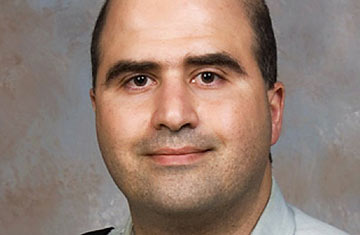
Accused Fort Hood gunman Major Nidal Malik Hasan
Despite last year's spike in the number of terrorism cases involving American Muslims, fears of growing radicalization in the American Muslim community may be greatly exaggerated, according to a new study. Researchers at Duke University and the University of North Carolina at Chapel Hill say that while homegrown Islamic terrorism is a serious issue, it remains a limited problem.
The report, released on Wednesday, notes that since 9/11, 139 American Muslims have committed violent terrorist acts, been convicted on terrorism charges involving violence or been arrested with charges pending. In a statement, the report's co-author Charles Kurzman, a UNC professor of sociology, points out that fewer than three dozen of the 136,000 murders committed in the U.S. since 9/11 can be attributed to acts of terrorism by American Muslims.
Titled "Anti-Terror Lessons of Muslim American Communities," the report says the community has successfully limited radicalization by policing itself. It cites denunciations of terrorism, internal self-policing, community building, government-funded support services and political engagement as some of the ways the community has limited the spread of radicalization. "Many community leaders have come to recognize that [tackling radicalization] is a matter of survival," says Ebrahim Moosa, a professor of religion at Duke and a co-author of the report. "They know that radicalization threatens the community at large and are working hard to defeat it." The researchers recommend that the government reinforce these efforts.
The two-year study was sponsored by the Department of Justice. Researchers interviewed 120 Muslims in Buffalo, N.Y.; Houston; Seattle; and Raleigh and Durham in North Carolina. They also analyzed American Muslim websites and publications and studied data on prosecutions of American Muslims on terrorism-related offenses.
Some highlights of the study:
• Of the 139 individuals linked to terrorist acts, only 40 successfully executed their plots, and most of those were overseas. In 70% of instances, law enforcement agencies were able to foil the plots before they even matured to a dangerous stage.
•Last year accounted for a high 41 cases, but the researchers note that it's too early to say if the spike represents a trend.
•Seventy-eight of the American Muslims arrested were members of small groups that either traveled abroad for training or planned attacks in the U.S. This confirms the view of some terrorism experts that the radicalization process relies on a group dynamic.
•Sixty-three of the 139 were U.S.-born, 22 were naturalized citizens and 25 legal residents.
•There is no single hotbed of radicalization: 43 "offenders" were from the South, 38 from the Northeast, 30 from the Midwest, 23 from the West and three from the Southwest.
•Although the 139 were predominantly young men, with 90 being under the age of 30, they hailed from diverse ethnicities: 32 were Arabs, 24 African-Americans, 24 South Asians, 20 Somalis and 20 whites. The authors say there is no "single profile or a common warning sign that signifies a homegrown terrorist."
Although homegrown terrorism is not a widespread problem, the report's authors warn that antiterrorism policies that alienate American Muslim communities may increase the threat. "Our research suggests that initiatives that treat Muslim-Americans as part of the solution to this problem are far more likely to be successful," said David Schanzer, director of Duke University's Triangle Center on Terrorism and Homeland Security, in a statement.
